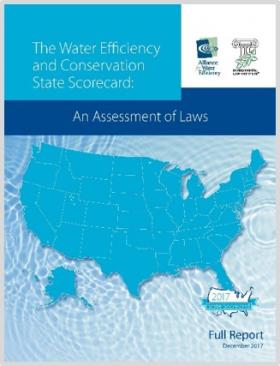Water Efficiency and Conservation State Scorecard

The Alliance for Water Efficiency (AWE) and the Environmental Law Institute (ELI) have released a five-year update to the 2012 Water Efficiency and Conservation State Scorecard: An Assessment of Laws and Policies. As with the 2012 State Scorecard, the 2017 update reviewed, scored, graded states for laws supporting water conservation and efficiency. In addition, the 2017 report added a new component for climate resiliency planning and performed a parallel evaluation, scoring, and grading process.
Though based on a 16-question survey, the 2017 update is an expansion of the 2012 edition; the underlying survey includes three new questions and a series of sub-questions for more complex topic areas. The goal of these changes was to develop a deeper understanding of legal frameworks supporting water conservation and efficiency, and climate resiliency planning. The topic areas addressed by the 2017 survey are: water loss control, consumptive use standards for appliances and fixtures, water conservation and drought planning, funding sources other than State Revolving Funds for urban conservation programs, technical assistance offerings, and customer metering, volumetric billing, and conservation-oriented rate structure requirements.
For the climate resiliency planning component, a three-question survey was used to explore what basic legal requirements obligate states to actively prepare for climate adaptation, prioritization of climate-related challenges, and the implications for water and wastewater utilities. The climate resiliency survey also included some sub-questions in order to fully understand legal parameters around critical base steps.
In all, the surveys produced more than a thousand data points which were all individually reviewed and verified. A draft of the report was made available for public comment in December 2017. All comments were responded to.





